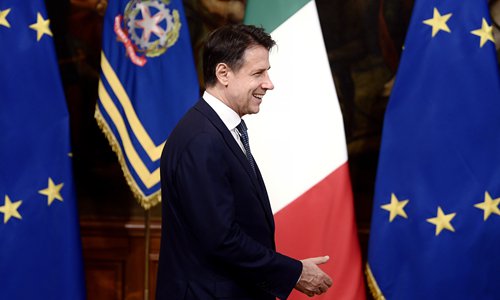HOME >> WORLD
Italy’s new pro-European cabinet includes anti-establishment coalition
Source:Reuters Published: 2019/9/5 22:43:41

Italian Prime Minister Giuseppe Conte smiles at the start of the new cabinet's first meeting on Thursday in Rome. Photo: AFP
A new Italian government was sworn into office on Thursday, with the pro-European Democratic Party (PD) flanking the anti-establishment 5-Star Movement in an unlikely alliance that has been cheered on by financial markets.
The administration looks certain to seek a much less contentious relationship with the EU than the previous coalition comprising 5-Star and the far-right League, which constantly railed against EU budget and migration rules.
The PD has taken charge of the economy ministry and the European affairs ministry while former PD prime minister Paolo Gentiloni looks certain to become Italy's next EU commissioner - appointments that should guarantee smooth ties with Brussels.
The prospect has cheered investors and Italian bonds have rallied strongly over the past week, with 10-year yields touching a new record low of 0.803 percent on Wednesday. They were above 1.5 percent at the start of August.
Prime Minister Giuseppe Conte, a law professor with no party affiliation, led his new team of seven women and 14 men in the swearing-in ceremony in the gilded presidential palace.
Italy's 67th government since World War II contains few political heavyweights, with an emphasis more on youth than experience. "It will be a fine adventure," said Education Minister Lorenzo Fioramonti.
In the clearest break from the past government, the interior ministry, previously headed by the League's tough-talking leader Matteo Salvini, was handed to a career civil servant and immigration specialist Luciana Lamorgese.
Unlike Salvini, who critics say spent more time on Twitter than in his ministry, Lamorgese has no social media accounts and will adopt a much lower profile than her predecessor as she looks to work with Brussels on drawing up new migration rules.
By the middle of May, Salvini was reported to have only gone to his ministry for 17 days since the start of the year, a figure he has not publicly disputed.
The government will not be fully operational until it wins confidence motions in the lower and upper houses of parliament slated for Monday and Tuesday respectively.
Conte is expected to win both votes, but his government will only have a slender majority in the upper house Senate which could come back to haunt him when particularly sensitive legislation gets put before the house.
Posted in: EUROPE